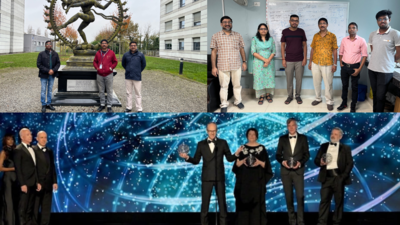- News
- City News
- kolkata News
- Kolkata Bose Institute scientists win breakthrough prize for CERN-ALICE
Trending
Kolkata Bose Institute scientists win breakthrough prize for CERN-ALICE
Kolkata's Bose Institute physicists have secured the prestigious Breakthrough Prize in Fundamental Physics for 2025 as part of the ALICE collaboration at CERN. Their pivotal role in studying the Quark-Gluon Plasma using the Large Hadron Collider has earned them this recognition.
KOLKATA: In a landmark achievement for Indian science, a team of physicists from Kolkata’s Bose Institute has been awarded the prestigious Breakthrough Prize in Fundamental Physics for 2025.
The recognition comes as part of the global ALICE collaboration at CERN's Large Hadron Collider (LHC), which explores the early moments of the universe by studying the Quark-Gluon Plasma (QGP)—a state of matter that existed just after the Big Bang.

Bose Institute Faculties at CERN
The Experimental High Energy Physics (HEP) group of Bose Institute—comprising faculty members Dr. Supriya Das, Dr. Sidharth Kumar Prasad, Dr. Saikat Biswas, Post-Doctoral Fellow Dr. Sanchari Thakur, and Senior Research Fellow Mintu Haldar—has played a crucial role in the ALICE experiment. The recognition is part of a $3 million prize awarded collectively to more than 13,500 researchers across four major LHC experiments: ATLAS, CMS, ALICE, and LHCb.

Faculty members and students of Bose Institute working in ALICE experiments
Congratulating the team, current Director of Bose Institute, Prof. Kaustuv Sanyal, remarked, “This is a great achievement not only for the Bose Institute but for the entire Indian high-energy physics community. It’s a strong inspiration for young minds to participate in global mega-science projects like ALICE.”
The HEP group has made major contributions across multiple aspects of the ALICE program—ranging from hardware development and simulation to data analysis and operations. One of its standout achievements was the development and deployment of an indigenously built Photon Multiplicity Detector (PMD), which operated from 2008 to 2018.

<p>2025 Breakthrough Prize Ceremony<br></p>
Bose Institute led its operations at CERN from 2014 until its decommissioning, and also took charge of the post-data collection cleanup and calibration processes in collaboration with Indian students and institutes.
The group was also instrumental in the upgrade of the Time Projection Chamber (TPC), a crucial detector within ALICE that now uses advanced Micro-Pattern Gas Detector technology for improved performance in high-luminosity environments. Researchers from the institute contributed significantly to the development of new readout chambers based on Gas Electron Multiplier (GEM) technology, known for its precision and stability.
In the physics analysis domain, Bose Institute scientists have led six major publications and contributed to several others, reinforcing their presence in international research.
ALICE Spokesperson Marco Van Leeuwen, in a message to all collaborators, stated, “I would like to congratulate the entire collaboration and the LHC community for this well-deserved recognition. All authors of publications based on Run 2 data up to July 15, 2024, will be listed as laureates.”
Other contributing members from Bose Institute include Sanjay Kumar Ghosh, Rathijit Biswas, Abhi Modak, Debjani Banerjee, Prottoy Das, and Md. Asif Bhatt.
The prize money is distributed among the four collaborations: $1 million each to ATLAS and CMS, and $500,000 each to ALICE and LHCb. These funds will support Breakthrough Prize studentships, enabling selected PhD scholars to spend up to two years at CERN for their research.
The award places Bose Institute and Indian high-energy physics firmly on the global scientific map, showcasing the country’s growing role in cutting-edge fundamental research.
End of Article
Follow Us On Social Media









